GLOCOM Forum: Japan's Revival-Beyond the Clash of Civilizations
Discussion Summary Part 1: Globalization, Modernization and the Clash of Civilizations
English summary of the panel discussion in Session 1 at GLOCOM's 10th anniversary forum on November 19, 2001
Panelists:
Ko Nakata (Associate Professor, Yamaguchi University)
Shumpei Kumon (Executive Director, Professor, GLOCOM)
Tomohisa Sashida (Manager, The Tokio Marine Risk Consulting, Co.,Ltd.)
Hiroshi Nakajima (Professor, Keio University and Visiting Professor, GLOCOM)
Moderator:
Yasuhide Yamanouchi (Professor, GLOCOM)
|
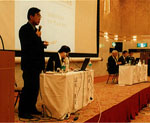 YAMANOUCHI: We would like to analyze the terrorists' attacks on September 11th from the following three standpoints. First, what kind of world vision or knowledge system, if any, does the terrorist group possess? Second, what kind of organizational principle or network does this group have? Third, how has this kind of group been born out of the conflict between those who have idiosyncratic cultural identity and those who push globalization in the market economy? In order to answer these and other related questions, we have four distinguished panelists today. First, Professor Nakata, please. YAMANOUCHI: We would like to analyze the terrorists' attacks on September 11th from the following three standpoints. First, what kind of world vision or knowledge system, if any, does the terrorist group possess? Second, what kind of organizational principle or network does this group have? Third, how has this kind of group been born out of the conflict between those who have idiosyncratic cultural identity and those who push globalization in the market economy? In order to answer these and other related questions, we have four distinguished panelists today. First, Professor Nakata, please.
|
|
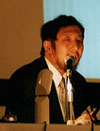 NAKATA: I will make my presentation as a specialist on Islam's political ideologies. First of all, we need to understand the September 11th incident in the context of American and British global strategies. The American and British governments had more or less anticipated this kind of attack to come from Bin Ladin's group members, and prepared themselves for such attacks. In that sense, things have been developing according to American and British scenarios, although the U.S. did not know exactly when the terrorists would attack. NAKATA: I will make my presentation as a specialist on Islam's political ideologies. First of all, we need to understand the September 11th incident in the context of American and British global strategies. The American and British governments had more or less anticipated this kind of attack to come from Bin Ladin's group members, and prepared themselves for such attacks. In that sense, things have been developing according to American and British scenarios, although the U.S. did not know exactly when the terrorists would attack.
Regarding the Qaeda network, they pursue Islamic restoration and have a wide-ranging loose network centering around them, but I think that the terrorists who attacked the U.S. this time may well have belonged to a group outside the wide and loose network of Qaeda. Their messages and behavioral pattern clearly indicate that they were very different from those that characterize Qaeda. This probably means that those terrorists are at least not main members of the Qaeda group.
Let me explain the relationship between the terrorist attacks and the Palestine problem. Bin Ladin has clearly mentioned the Israel-U.S. coalition against Arab-Islam and 80 some years of hardship for Arab-Palestine people. This is a kind of logic that we heard during the Gulf War, when U.S. forces started to be stationed in Saudi Arabia, a fact that seems to have caused Bin Ladin's anti-U.S. stance and also the terrorist attacks against the U.S.
In order to see why Bin Ladin and even Muslims in Southeast Asia are furious about the Israeli-Palestine situation, we need to understand the Islamic view of the world, which is very different from our modern national state ideology. National land, people and sovereignty correspond to the House of Islam, the Islamic Community and the Kalif system, respectively. And these three systems are based on Shariah, that is, the Islamic law. According to this view of the world, Israel has invaded the House of Islam and, therefore, all Muslims across national borders must feel that their land has been violated. Now it should be clear what Bin Ladin's group and Islamic fundamentalists want. As their ultimate goal, they would like to see Islamic nations united to observe Islamic law. The terrorist group attacked the U.S. in an attempt to force the U.S. to withdraw from their Islamic land.
As a network society, the Islamic world lacks a closed system of formal institutions. They do not have churches and they do not even have such concepts as nations, corporations, etc. Instead, they share Islamic law as interpreted by law scholars whose network is extended beyond national borders. This is a challenge for modern national state ideologies. The Islamic world was most advanced in the era of mercantile capitalism, but its loose network system did not work well in the era of industrial capitalism. It remains to be seen whether it can revive in the era of information society.
|
|
YAMANOUCHI: Thank you very much, Professor Nakata. Now we would like to have comments from Professor Kumon.
|
|
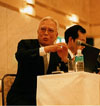 KUMON: I think there are three elements, that is, Bin Ladin in the middle, ordinary Muslims on the right, and the terrorists who attacked the U.S. on the left. Bin Ladin's position seems to be such that he could not tolerate U.S. presence in his homeland, Saudi Arabia, and he tried to make this point by referring to the Israeli-Palestine problem and other related issues and by supporting terrorist groups who advance his cause even if they are not members of his organization. Given this understanding, a couple of questions can be raised. KUMON: I think there are three elements, that is, Bin Ladin in the middle, ordinary Muslims on the right, and the terrorists who attacked the U.S. on the left. Bin Ladin's position seems to be such that he could not tolerate U.S. presence in his homeland, Saudi Arabia, and he tried to make this point by referring to the Israeli-Palestine problem and other related issues and by supporting terrorist groups who advance his cause even if they are not members of his organization. Given this understanding, a couple of questions can be raised.
First, there seem to be some conflicts, at least in principle, between the modern system of states and the institutional system that forms the foundations for Islamic religious culture. The question is whether they will coexist. One possibility is that the modern system of states might be changed or modified to accommodate Islamic religious culture in the future. Or it could lead to a kind of clash between civilizations.
Second, what kind of people are the terrorists who attacked the U.S.? It looks like they are "netizen terrorists" whose behavior is not necessarily consistent with the religious teaching of Islam. All they need is pieces of materials to justify their behavior, even if their behavior may not be consistent. They might be interested in just developing new methods of terrorism. If so, our future is at risk, since they could launch various new types of terrorist attacks in a very loose, decentralized fashion outside any organized network.
|
|
YAMANOUCHI: Next, we will take up possible responses by business organizations to this kind of terrorism, that is, the issue of risk management to be discussed by Mr. Sashida, please.
|
|
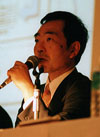 SASHIDA: Generally speaking, Japanese corporations tend to react to some incident or emergency, but soon forget everything as time passes. The correct idea of risk management was first introduced into Japan when the Hanshin earthquake hit in 1995. Then there have been a series of scandals involving business corporations, and it has been said that Japanese-style management is no longer effective and should be reexamined. One possible approach to this problem is to implement risk management in Japanese business. SASHIDA: Generally speaking, Japanese corporations tend to react to some incident or emergency, but soon forget everything as time passes. The correct idea of risk management was first introduced into Japan when the Hanshin earthquake hit in 1995. Then there have been a series of scandals involving business corporations, and it has been said that Japanese-style management is no longer effective and should be reexamined. One possible approach to this problem is to implement risk management in Japanese business.
First, management must decide to introduce risk management and establish a risk management committee to list and evaluate various risks surrounding them in phase 1. Here, choices have to be made by management as to which risks must be given priorities and taken care of. Then in phase 2, each of those selected risks such as terrorism, patents, recall problems, etc. should be addressed by setting up a committee individually, in which precautionary measures can be taken to deal with those risks.
Another point is that in the past Japanese corporations have emphasized the need for security so much that it has often been assumed that no bad incident or accident could happen if sufficient security measures are adopted. But the right attitude is that those incidents could happen even if we take every possible precautionary measure. Actually, that is what "risk management" means in the narrow sense. Therefore, it is important to think of what to do, in advance, if something does happen. Manuals should be prepared, read and understood. For that, we need education and training. So in phase 3, simulations, training, feedback and review processes are in order.
Then we return to the role of management, where top management, not divisional heads, should be in charge of risk management. At the same time, management should be checked by auditors, and the board of directors should review management, including risk management based on auditing. But very few Japanese corporations are yet to adopt this kind of system, and most of them are being pushed around by various incidents such as product liabilities, food poisoning, terrorism, etc.
Regarding terrorism, we have to accept the fact that our environment has changed and we need to adjust our risk priorities to deal with terrorism. Here, the first thing to do is to collect information, where the Internet is a very convenient means to do so. But at the same time, we need to know what is correct among various kinds of information. Here again, we have to learn to find out.
It has now become evident that Japanese corporations have to deal with management risks that they produce themselves such as product liabilities, recall, fire hazards, etc., as well as politico-socio-economic risks that they cannot solve by themselves such as terrorism. In any case, we have entered an era when corporations themselves should decide on what to do to deal with various risks on their own.
|
|
YAMANOUCHI: Finally, Professor Nakajima will talk about Japan's journalistic responses and foreign policy.
|
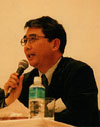 NAKAJIMA: I will briefly talk about three points. The first point is about my personal experience on September 11, when I was in San Francisco. The situation then was just like a war emergency without a siren, as very few people were out on the street except tourists and homeless people. I later found out that on that day residents received warnings from the city, and there were some rumors that some of the seven missing planes would soon hit the San Francisco area, particularly the Golden Gate Bridge and the downtown business center. Strangely enough, a month later, some documents spelling out such a plan were reportedly discovered from Qaeda's hideout in the Philippines. So it is conceivable that the warnings and rumors I heard then were based on the information that the authorities already had at the time. This might well confirm Professor Nakata's assumption that U.S. authorities such as the CIA or FBI should have known some of Qaeda's detailed plans in advance, although exact attack dates were not known. NAKAJIMA: I will briefly talk about three points. The first point is about my personal experience on September 11, when I was in San Francisco. The situation then was just like a war emergency without a siren, as very few people were out on the street except tourists and homeless people. I later found out that on that day residents received warnings from the city, and there were some rumors that some of the seven missing planes would soon hit the San Francisco area, particularly the Golden Gate Bridge and the downtown business center. Strangely enough, a month later, some documents spelling out such a plan were reportedly discovered from Qaeda's hideout in the Philippines. So it is conceivable that the warnings and rumors I heard then were based on the information that the authorities already had at the time. This might well confirm Professor Nakata's assumption that U.S. authorities such as the CIA or FBI should have known some of Qaeda's detailed plans in advance, although exact attack dates were not known.
The second point is about the responses of Japan's newspapers to this incident. As I have checked Japan's five major newspapers regarding their stance for or against U.S. actions for about 40 days after September 11th , I have found out that their stance tends to go to extremes, often fluctuating even day by day. This is mainly because they focused on whether Japan should support the U.S. or not, rather than what kind of foreign policy Japan should take in the long run.
This leads to my third point. That is what Japan should do towards the outside world in the new era of information and knowledge. Hoping that terrorism will not become so prevalent as Professor Kumon suggested, I think we need to help other countries acquire digital technology as common knowledge through concrete actions such as our DOT FORCE activity. and try to shape our national strategy and foreign policy accordingly in a more concrete manner.
|
|





